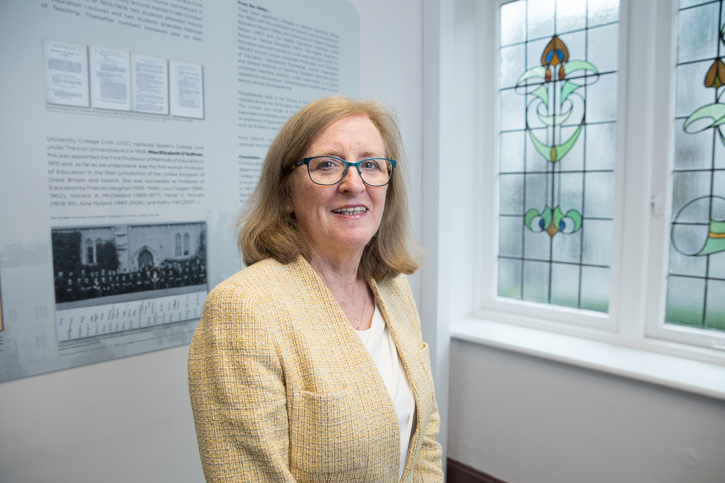- Home
- About the EDI Unit
- News & Events
- Publications
- EDI Training Hub
- Equality Committee
- Gender Identity and Expression
- Sexual Violence and Harassment Framework
- Speak Out
- University of Sanctuary
- Athena SWAN
Professor Kathy Hall, School of Education
Kathy Hall, Professor of Education

College: Arts, Celtic Studies & Social Sciences
School: Education
Research Interests: Learning and teaching across the lifespan, curriculum and assessment, inclusion and equality in learning and education, and contemporary Irish childhoods
IRIS profile: http://publish.ucc.ie/researchprofiles/A013/khall
What first attracted you to your academic discipline?
Probably trying to fathom some of the complexities of education especially around the way schooling functions to shape lives, learning and careers.
How were you drawn to your current research interests?
Education is an inter-disciplinary field of study and this ultimately brought me to a cultural study of education and learning where politics, history, discourse, psychology, sociology etc. are all relevant. Learning is ubiquitous and the process is the same whether in homes, school, workplaces, clubs, universities but what is available to be learned within settings is another matter altogether and it is this phenomenon that I have found intriguing over the years. I was first drawn to my current interests through my PhD study back in the 1980s on how children develop language and literacy which was under the guidance of a wonderful mentor Dr Dan Murphy (TCD) who sadly is no longer with us.
What professional achievements do you consider particularly rewarding?
Varies at different points in my history. I have always found supervising PhD studnets especially rewarding - seeing them grow intellectually and use their work to make a difference in their professional contexts including progressing their careers. In education, PhD students come from a variety of educational backgrounds and are usually in mid-career and already in senior roles in their organisations. They are really colleagues and they enhance my own work in many ways.
In the competitive climate that is the academy, it would be dishonest of me not to acknowledge the seductive nature of winning a research grant or getting published in a valued journal or finally submitting the manuscript for a book or submitting that Final Report. I have found those achievements rewarding for myself and my co-workers.
Always rewarding is the privilege of being able to shape debate, inform policy and influence practice through involvement on national bodies like the Teaching Council and my co-chairing of the Standing Conference on Teacher Education North and South, a body set up under the Good Friday Agreement.
Finally working collaboratively with colleagues to develop and redevelop our own provision is rewarding and exciting.
Have you had professional role models? What impact did they have on you?
I worked in several universities before coming to UCC and in all places I encountered both inspirational and not so wonderful models. All of them had an impact on me and I learned much from them. The inspirational role models here and elsewhere had much in common: fairness and a sense of justice, and adaptive intelligence, commitment to students, and dedication. There are plenty such people in my own School in UCC, adminisrtative and academic, who I work with and learn from every day. Their impact adds up to making work a life-enhancing and utterly worthwhile experience. I'm conscious too of the legacy of those before me like Elizabeth O'Sullivan, who in 1910 UCC inaugurated as Professor of Education - the first female Professor of Education in the then jurisdiction of the United Kingdom of Great Britain and Ireland.
What aspects of your work do you find most rewarding?
Collaborating with colleagues who are prepared to be open-minded and dedicated; reading the research of others who are pushing boundaries and challenging thinking; and seeing students successfully complete their studies despite struggles and setbacks.
Any details you wish to share about how being female has impacted upon your career (positively or negatively)?
Being female has not impacted upon my career either positively or negatively.
Academic careers present specific challenges in achieving balance, whether between research, teaching and administration, or in work/life balance. What advice might you give a student/younger colleague/your 18-year old self?
I think the key is not to be tempted to put off one of these (research) until one 'has time' ('in the summer'). A little every day. As to work life balance, I'm not convinced about this insofar as work and life are not completely separate things. It is a truism that work expands to fill the time available but I have been fortunate and privileged to love most (if not all!) the tasks of my academic career. I appreciate how incredibly supportive my husband is and how supportive colleagues make such a difference. To my 18-year old self, I would say there is no blueprint and be suspicious of grand planning, better to enjoy and seek fulfillment by working with supportive colleagues and don't be afraid to change 'course' and move on if there are insurmountable constraints.
